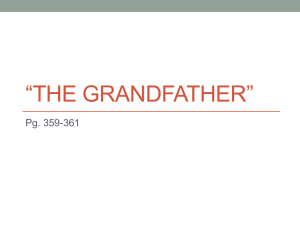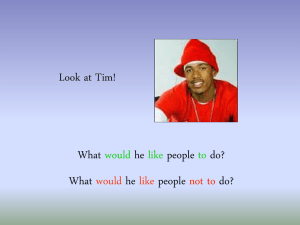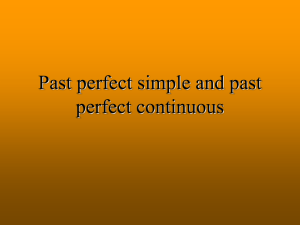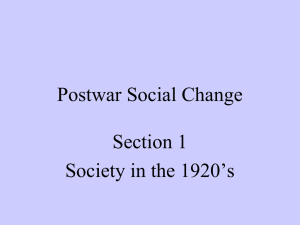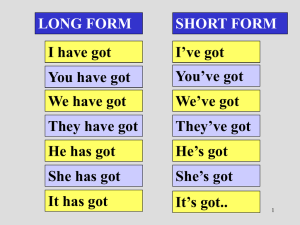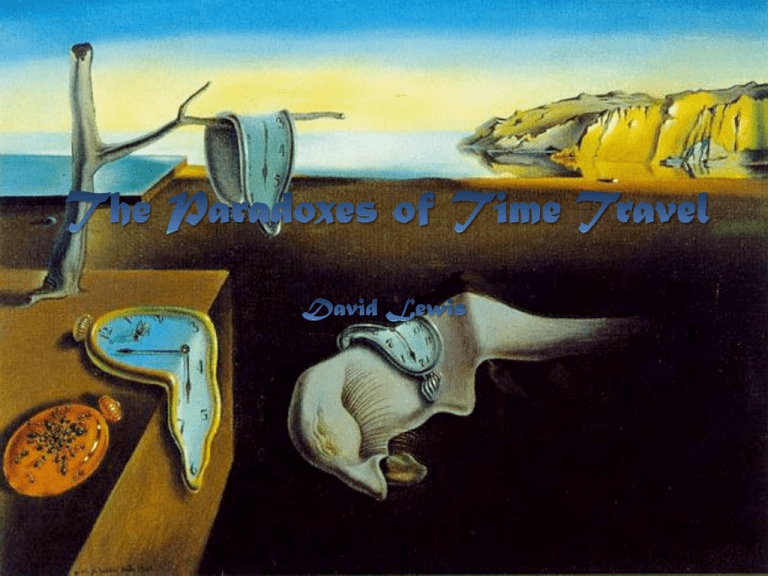
About Time
• The topology of time
– Bounded or unbounded: is there a beginning (end) in
time?
– Continuous or discrete?
– Linear or closed: is there an Eternal Return?
– Branching or non-branching?
• Some problems
– Determinism, fatalism and free will
– Time travel
Lewis’ Assumptions
• Enduring things have temporal as well as spatial parts
– Eternalism vs. Presentism
– Worm view vs. Stage account
• Personal identity criteria
– psychological continuity and connectedness
– causal continuity
• Distinction between external and personal time
The Four-Dimensional World
• The world—the time traveler's world, or ours—is a four-dimensional
manifold of events.
• Time is one dimension of the four, like the spatial dimensions except
that…Time remains one-dimensional, since no two time-like dimensions
are orthogonal.
• Enduring things are timelike streaks: wholes composed of temporal parts,
or stages, located at various times and places.
• Change is qualitative difference between different stages—different
temporal parts—of some enduring thing, just as a “change” in scenery
from east to west is a qualitative difference between the eastern and
western spatial parts of the landscape.
To the 4-d world
Temporal Parts
time’s arrow
The Worm View (Lewis): enduring things are space-time
“worms” composed of temporal (time) parts or stages.
Temporal Parts
time’s arrow
The Worm View (Lewis): enduring things are space-time
“worms” composed of temporal parts of stages.
Temporal Parts
time’s arrow
• Change is qualitative difference between different
stages—different temporal parts—of some enduring thing,
just as a ‘change’ in scenery from east to west is a
qualitative difference between eastern and western spatial
parts of the landscape
• Cambridge Changes: changes in relational or extrinsic
properties, e.g. Xantippe’s being widowed.
Varieties of Time Travel
What is time travel?
[T]he time elapsed from departure to arrival (positive, or perhaps
zero) is the duration of the journey. But… [for] a time traveler,
the separation in time between departure and arrival does not
equal the duration of his journey.
• Back to the Future: time travel to the past and back
• Around to the Past: travel around a closed time-like curve
• Forward to the Future: time travel to the future
Personal Time
[H]ow it could be that the same two events were separated by
two unequal amounts of time?…I reply by distinguishing time
itself, external time as I shall also call it, from the personal time
of a particular time traveler: roughly, that which is measured by
his wristwatch.
born
dies
Ceasar’s Personal Time
100 B.C.
External Time
March 15, 44 B.C.
Forward to the Future
• We’re always traveling to the future, but the duration of our
journey in personal time is the same as the elapse from the
beginning to the end in external time.
• In Forward to the Future Time Travel the elapse of time from
the beginning to the end of the time-traveler’s journey in
external time is greater than the duration of his journey in
personal time.
• So the time traveller can land in the remote future without
aging significantly.
LETS TRY IT!
Around to the Past
Through the Wormhole
Back to the Future
Traveling to the Past
Marty McFlye’s Personal Time
re-enters time machine and goes back to the future
meets
parents as
teenagers
enters time
machine
born
1955
1958
External Time
1985
Could you meet your past self?
The man who was his
own mother*
“Jane” is left at an orphanage as a
foundling. When “Jane” is a teenager, she
falls in love with a drifter, who abandons
her but leaves her pregnant. Then disaster
strikes. She almost dies giving birth to a
baby girl, who is then mysteriously
kidnapped. The doctors find that Jane is
bleeding badly, but, oddly enough, has
both sex organs. So, to save her life, the
doctors convert “Jane” to “Jim.”
http://mkaku.org/home/?page_id=252
And then . . .
“Jim” subsequently becomes a roaring
drunk, until he meets a friendly bartender
(actually a time traveler in disguise) who
whisks “Jim” back way into the past. “Jim”
meets a beautiful teenage girl, accidentally
gets her pregnant with a baby girl. Out of
guilt, he kidnaps the baby girl and drops her
off at the orphanage. Later, “Jim” joins the
time travelers corps, leads a distinguished
life, and has one last dream: to disguise
himself as a bartender to meet a certain
drunk named “Jim” in the past…
The Man Who Was His
Own Mother
Jim meets Bartender who whisks
him back to the past
Baby Jane dropped
Off at orphanage
Baby Jane
Is born
Jane becomes
Baby Jane’s
mother:
Jane is born
Jim becomes distinguished
Time-Traveler
Disguised as Bartende
meets Jim The Drunk
Drops Baby Jane off
At orphanage
Jim becomes Baby
Jane’s father
Jim meets Jane
Bartender takes Jim
Back to the past where
he meets Jane
Causation and the ‘Arrow of Time’
(External) time goes in only one direction.
• On one account the direction of time just is the direction of
causation: from past to future.
• BUT if BTF time travel is possible then it is possible for later
events to cause earlier events
– Note: Given the for personal identity, events that occur to
stages later in external time must cause events that occur
to stages that are earlier in external time.
• Is the ‘backward causation’ (required for BTF time travel)
possible? And if so how?
Could you kill your baby-self?
Uh-oh!
Can Tim kill his grandfather?
It seems that he can…
Tim…has what it takes.
Conditions are perfect in
every way: the best rifle
money could buy,
Grandfather an easy target
only twenty yards away…Tim
is as much able to kill
grandfather as anyone ever is
to kill anyone.
A duplicate of Tim could…
Suppose that down the street another sniper, Tom, lurks
waiting for another victim, Grandfather’s partner. Tom is not
a time traveler, but otherwise he is just like Tim.
…but it looks like Tim can’t!
Grandfather begat Father in 1922 and Father begat Tim in
1949. Relative to these facts Tim cannot kill Grandfather.
What I can do, relative to one set of facts, I
cannot do relative to another more inclusive, set
[F]acts about my larynx and
nervous system are
compossible with my speaking
Finnish. But don’t take me
along to Helsinki as your
interpreter.
Tim can’t kill Grandfather
Tim's killing Grandfather that
day in 1921 is
compossible…with all the facts
of the sorts we would
ordinarily count as relevant in
saying what someone can
do…Relative to these facts,
Tim can kill Grandfather.
But his killing Grandfather is
not compossible with another,
more inclusive set of
facts…[including] the simple
fact that Grandfather was not
killed.
Tom can’t kill Grandfather’s partner
Exactly the same goes for
Tom’s parallel failure. For Tom
to kill Grandfather’s partner
also is compossible with all
facts of the sorts we ordinarily
count as relevant, but not
compossible with a larger set
including, for instance, the fact
that the intended victim lived
until 1934.
Fatalism
The thesis that whatever will happen in the future is already
unavoidable, i.e. that no one is able to prevent it from occurring.
(1) There exist now propositions about everything that might happen
in the future.
(2) Every proposition is either true or else false
(3) If (1) and (2), then there exists now a set of true propositions that,
taken together, correctly predict everything that will happen in the
future.
(4) If there exists now a set of true propositions that, taken together,
correctly predict everything that will happen in the future, then
whatever will happen in the future is already unavoidable.
(5) Therefore, whatever will happen in the future is already
unavoidable.
Lewis’ objection to Fatalism
• I am not going to vote Republican next fall. The fatalist argues
that, strange to say, I not only won't but can't; for my voting
Republican is not compossible with the fact that it was true
already in the year 1548 that I was not going to vote
Republican 428 years later.
• My rejoinder is that this is a fact, sure enough; however, it is
an irrelevant fact about the future masquerading as a
relevant fact about the past, and so should be left out of
account in saying what, in any ordinary sense, I can do.
• Compare the sense in which I ‘can’t’ not raise my arm if that is
what I in fact do, with the senses in which I can’t wiggle my
ears, or fly, or buy a 2 million dollar house, or vote in the
UK…or any of the other can’t we ordinarily care about.
• There are true propositions about the future
• Given the facts about the future that make them true we
can’t ‘change the future’
• But when we worry about what we can or can’t do, we
aren’t concerned about future facts and so shouldn’t be
worried about an irrelevant fact about the future
“masquerading as a fact about the past.”


